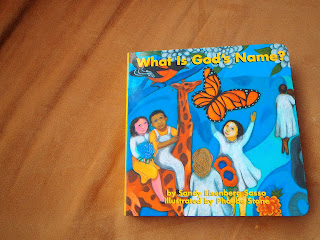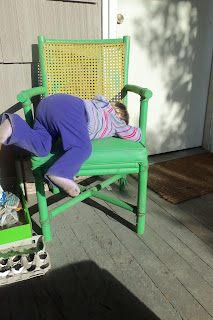Children's books for liberal Christians 2
So here are 2 books that are great for talking about diverse images of God.
One of them them, What is God's Name? is a board book. The other one In God's Name is the longer version of the same book.
The difference is that In God's Name involves a conflict where people have to decide what the correct name of God is. They decide that that all names are valid but the best name is "one."
The jist of the book is this:
All these different people give God a name: It goes something like this:
Nurse calls God healer
The child who laughs calles God bringer of Joy
The aborist calls God tree of life...
That's the jist.
Then in their is the conflict. Which one is right?
So my analysis of these books:
Good:
- The are a lot of people of different colors in these books.
- The people have different feelings.
- The different colors of people are named -brown people, white people etc.
- Their are a lot of images of God and it honors that our images of God come from our context "the soldier called God peacemaker..." the nursing mother called God, "source of life."
- It is a lovely read. As a parent you sometimes get stuck reading books again and again. I really appreciate that reading this is also prayer for me.
Bad:
- the idea that all names for God are equal I disagree with. For example, King is a paradoxical name for a Christian view of God. Jesus disrupted power systems.
- I don't get that the name for God is "one." I find that pretty meaningless. What does "one" mean. It is impersonal.
Other random thoughts:
- This is theistic book. It is not Christian. There is no Jesus or Christ. This is not about salvation or anything like that.
All in all though, I think this is a really really good book. It is a great place to start with images of God, to maybe pray with different ones. It think even reading it as a family would be lovely and deciding what image you might want to pray with is nice.






I really appreciate your analysis of the book. I'm actually teaching it at my Hebrew School soon.
ReplyDeleteAt the end of the book, they all call God One, because no matter what they named God, they were talking about and to the same God. While this name for God might feel odd, it is a radical claim that God can have so many different meanings to so many different people. It also means that God can hold all these different meanings for every individual. This could be an interesting starting point for talking with children about all their different experiences, ideas, and questions about God.
On a side note, God being One is a central tenant in Judaism, and with the author being Jewish, I'm not at all surprised with this conclusion. :-)